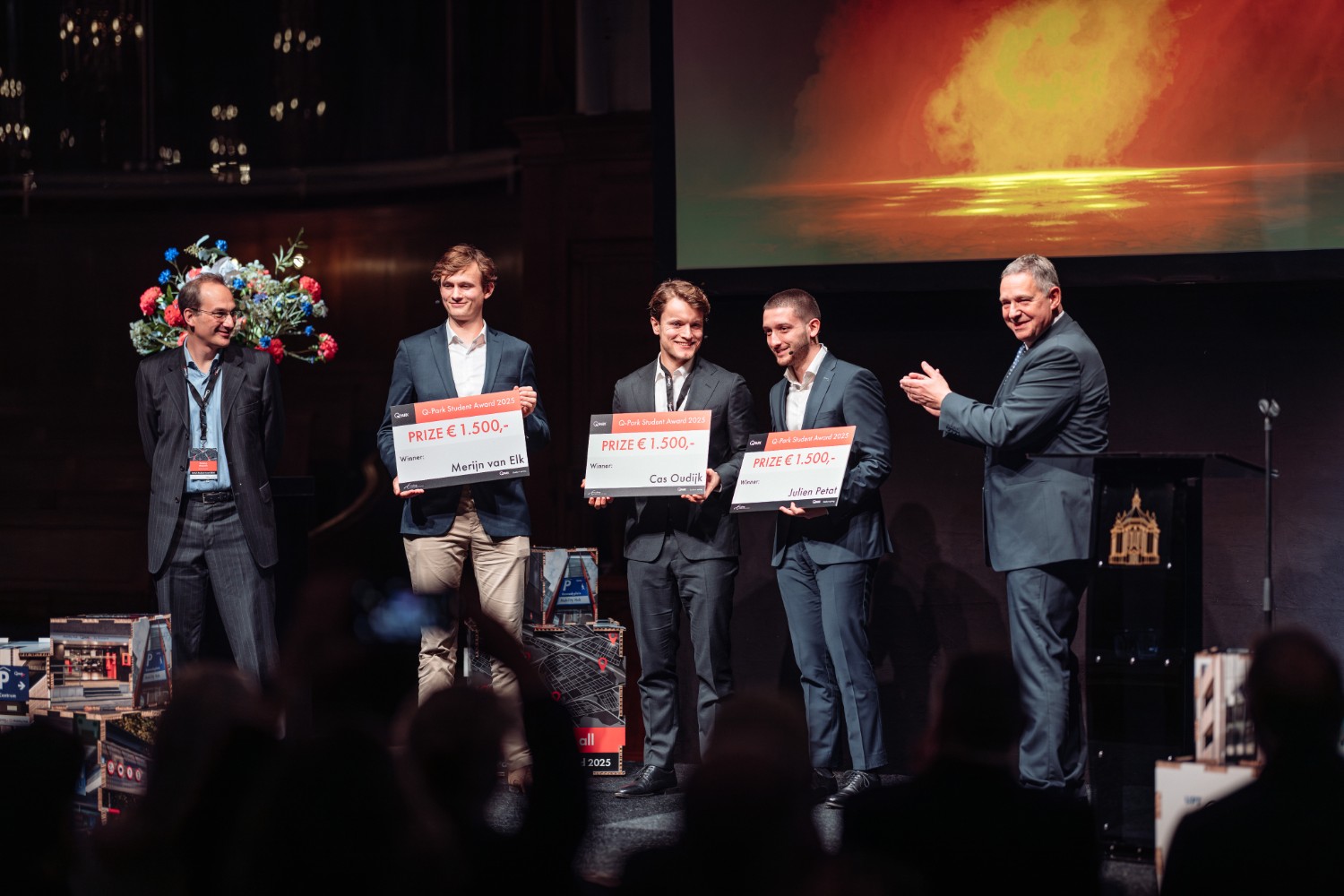Q-Park announces Student Award winners 2025
Q-Park and Erasmus University Rotterdam held the 11th annual Student Award and Thought Leader Event in The Hague at the Nieuwe Kerk today. The theme for the 2025 event was Perspectives on urban mobility: then, now and tomorrow.
Morning programme
Following the successful walking tour at the previous event, about 70 guests set off in groups to learn about how Q-Park is supporting The Hague city council manage mobility. The first stop was the award-winning Mobility Hub Q-Park Centrum. Here, Q-Park partners with urban logistic services, last-mile micro-mobility services as well as EV charging and car-sharing operators, thus offering more than just parking.
The tour stopped to admire the Netherlands’ first multistorey car park built in 1930 when parking was already challenging in The Hague. Now a national monument, the Torengarage provides parking at the edge of the car-free city centre including the historic Hofkwartier (Court Quarter), a short walk from the Dutch Parliament and Noordeinde Palace.
Student Award and Thought Leader Event
The afternoon programme took place in the Nieuwe Kerk, which is understandably one of the Top 100 Dutch heritage sites. This former church is now a bustling cultural centre, hosting a wide variety of cultural, private and business events.
In his word of welcome Q-Park CEO Frank De Moor said that this is perhaps the most important event in the Q-Park calendar. “We're a long-term investor with a commitment to society, we connect communities” he said, “Parking is about servicing the community. And when addressing their mobility transition needs, we're part of the solution.”
Keynote speakers focus on the future of mobility
Emile Jutten, Manager Mobility in The Hague talked about how The Hague is adapting the city to create space for people and mobility. With the sea on one side and neighbouring municipalities, The Hague has nowhere to expand. It's the most densely populated Dutch city and also has the most cars per square metre, and growing mobility needs. Even bicycles need wide lanes to ensure safe travel. By 2040, the city wants to achieve a mindset shift that will reduce the number of short car journeys (less than 5 km) by 20% and replace these trips with walking and cycling.
Carlo van de Weijer, General Manager of the Eindhoven AI Systems Institute at Eindhoven University of Technology (TU/e), gave a thought-provoking presentation. He challenged attendees to question traditional policies designed to encourage people to use public transport rather than individual mobility. In his vision of the future of parking, he expects:
more rather than fewer cars will need to park;
a shift from on- to off-street parking as cities declutter streets and EV charging points become part of the energy system;
parking will become more costly, but the alternatives may be even more expensive as people are mobile by design.
Q-Park Student Award 2025
The first student award organised by Q-Park and Erasmus University Rotterdam in 2014 was held in a small university meeting room with just a handful of attendees. A stark contrast to today's event where more than 130 guests gathered to hear how theory spills over into the real world of parking and mobility.
Student research projects make a valuable contribution to bridging the knowledge gap. This award is open to all European universities and colleges. Since its inception in 2014, more than 100 theses and projects have been considered for the award.
This year, projects were submitted from Erasmus University Rotterdam, TU Delft, VU Amsterdam and the University of Antwerp, from which 10 were selected based on their scientific quality. A panel of Parking & Mobility experts assessed the submissions and selected three finalists. Each of the winning students gave a brief presentation of their research and findings.
Giuliano Mingardo, senior researcher at Erasmus University Rotterdam and specialised in parking policy and mobility management, introduced the students and praised the high scientific standard of their research. He emphasised that AI might be able to help generate ideas, but it's not capable of implementing solutions.
The winners are:
Cas Oudijk, TU Delft: Relocation strategies for shared electric vehicles to transport energy and provide vehicle-to-grid services.
Julien Petat, Erasmus University Rotterdam: Assessing the perceived value of mobility solutions: a quantitative study in Germany.
Merijn van Elk, Vrije Universiteit Amsterdam: The impact of reducing on-street parking on house prices: evidence from Amsterdam.
A summary of these three theses and the winning theses from previous years are available on the Q-Park Student Award website.
Following the presentations, Frank De Moor presented each of the winners with a cheque for €1,500.

From left to right: Giuliano Mingardo, Merijn van Elk, Cas Oudijk, Julien Petat, Frank De Moor
Q-Park looks back on a successful day of learning and networking.
